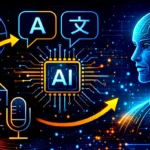AI in mental health has emerged as a groundbreaking force, revolutionizing the landscape of mental health care and offering innovative solutions to address the complexities of mental well-being. This article delves into the intricate realm of AI in mental health, exploring its fundamental principles, diverse methodologies, key advantages, notable applications, and the challenges it navigates in the pursuit of fostering mental health awareness and providing personalized support.
Unveiling AI in Mental Health
AI in mental health involves the integration of artificial intelligence technologies to analyze and interpret data related to mental health, providing insights and supporting clinical decision-making. This intersection of technology and mental health care aims to enhance early detection, personalized treatment, and ongoing support for individuals experiencing mental health challenges. The multifaceted role of AI in mental health encompasses a range of applications, from predictive analytics to virtual therapy tools.
The Role of Machine Learning in Mental Health Analysis
Machine learning, a subset of artificial intelligence that enables algorithms to learn from data and make predictions or decisions, is at the core of AI in mental health. In mental health analysis, machine learning algorithms process vast datasets to identify patterns, risk factors, and potential indicators of mental health conditions. This adaptability enables the development of predictive models to assist clinicians in early intervention and personalized treatment planning.
Natural Language Processing for Emotional Analysis
Natural Language Processing (NLP) plays a crucial role in emotional analysis within the context of mental health. NLP algorithms analyze text and speech patterns to discern emotional states, sentiments, and linguistic cues that may indicate underlying mental health issues. This technology is particularly valuable in monitoring online conversations, social media posts, and even virtual therapy sessions, providing additional layers of insight for mental health professionals.
Wearable Technology for Real-Time Monitoring
Wearable technology, enhanced by AI, offers real-time monitoring of physiological and behavioral indicators related to mental health. Devices such as smartwatches and fitness trackers equipped with AI algorithms can track changes in sleep patterns, heart rate variability, and activity levels. This continuous monitoring provides valuable data for early detection of stress, anxiety, or depressive symptoms, facilitating proactive interventions.
Advantages of AI in Mental Health
Adopting AI in mental health presents many advantages, reshaping the approach to mental health care and contributing to more accessible, personalized, and timely interventions.
Early Detection and Intervention
One of the primary advantages of AI in mental health is its ability to facilitate early detection and intervention. Machine learning models can identify subtle patterns in data that may precede the onset of mental health conditions, enabling timely intervention and support. This proactive approach can prevent the escalation of mental health challenges and improve overall outcomes.
Personalized Treatment Plans
AI facilitates the creation of personalized treatment plans based on individualized data. By considering a person’s unique characteristics, responses to treatment, and environmental factors, AI-driven algorithms can recommend tailored interventions, medications, or therapeutic approaches that are most effective for each individual. This level of personalization enhances treatment effectiveness and improves the overall experience for individuals seeking mental health support.
Enhanced Accessibility to Mental Health Resources
The integration of AI expands the accessibility of mental health resources. Virtual mental health tools, chatbots, and teletherapy platforms powered by AI provide on-demand support and information, reducing barriers to seeking help. This accessibility is particularly crucial in reaching individuals who may face geographical, social, or stigma-related challenges in accessing traditional mental health services.
Data-Driven Insights for Clinicians
AI-generated, data-driven insights empower mental health professionals to gain a deeper understanding of their clients. By analyzing patterns and trends in patient data, clinicians can make more informed decisions, track treatment progress, and adjust interventions as needed. This collaboration between AI and mental health practitioners enhances the overall quality of care and supports evidence-based practices.
Applications of AI in Mental Health
AI finds diverse applications within the mental health landscape, offering a range of tools and technologies to support individuals, clinicians, and researchers in their efforts to promote mental well-being.
Virtual Therapeutic Interventions
Virtual therapeutic interventions powered by AI provide users with a virtual environment for mental health support. These interventions may include virtual reality (VR) therapy, guided meditation apps, or AI-driven chatbots offering emotional support. These tools help foster resilience, coping skills, and emotional well-being.
Sentiment Analysis in Social Media Monitoring
AI-driven sentiment analysis is crucial in monitoring mental health discussions on social media platforms. By analyzing posts, comments, and interactions, algorithms can identify individuals at risk, assess community mental health trends, and provide early warnings of potential mental health crises. This application contributes to a broader understanding of mental health.
Suicide Risk Assessment and Prevention
AI algorithms can be employed for suicide risk assessment and prevention. By analyzing various data sources, including text messages, social media posts, and behavioral indicators, these algorithms can identify individuals at heightened risk of self-harm or suicide. Timely interventions, such as alerts to mental health professionals or crisis hotlines, can be initiated to provide support.
AI-Powered Chatbots for Emotional Support
AI-powered chatbots equipped with natural language processing capabilities offer on-demand emotional support. These chatbots engage in conversations, provide empathetic responses, and offer coping strategies based on the user’s emotions. This 24/7 support system fills gaps in mental health care accessibility and immediate response.
Challenges in AI Adoption in Mental Health
Despite the potential advantages, integrating AI into mental health presents challenges that require careful consideration to ensure the ethical, effective, and responsible use of these technologies.
Ethical Concerns and Privacy Issues
The ethical implications of AI in mental health raise concerns regarding privacy, consent, and the responsible use of sensitive data. Striking a balance between providing personalized care and safeguarding individuals’ privacy is essential to building and maintaining trust in AI-powered mental health interventions.
Bias in Algorithmic Decision-Making
Algorithmic bias poses a significant challenge in the development of AI applications, including those in the field of mental health. Biases in training data may lead to disparities in diagnosis and treatment recommendations, disproportionately affecting certain demographic groups. Ensuring fairness and equity in AI-driven mental health interventions requires ongoing scrutiny and improvement.
Lack of Regulation and Standardization
The absence of comprehensive regulations and standards for AI in mental health poses challenges in ensuring the quality, safety, and effectiveness of these technologies. Establishing guidelines for ethical AI development, data security, and clinical validation is essential to prevent potential risks and promote responsible innovation in mental health care.
Future Trends in AI in Mental Health
As technology evolves, future trends in AI for mental health are expected to lead to more advanced and nuanced applications, ultimately shaping the future of mental health care and support.
Integration of Biomarkers for Holistic Assessment
Integrating biomarkers, such as physiological and neurobiological indicators, with AI technologies is a promising trend. This holistic approach aims to enhance the precision and accuracy of mental health assessments, providing a more comprehensive understanding of individual needs and tailoring interventions accordingly.
Collaborative Care Platforms with AI Support
The future of mental health care involves collaborative care platforms that integrate AI support. These platforms facilitate communication and coordination among healthcare providers, mental health professionals, and AI systems, ensuring a cohesive and well-coordinated approach to patient care.
AI-Enhanced Personalized Wellness Apps
Personalized wellness apps, enriched by AI capabilities, will become more prevalent. These apps can offer users personalized strategies for stress management, emotional regulation, and overall well-being based on continuous data analysis and user feedback, contributing to proactive mental health maintenance.
Continued Integration with Telehealth Services
The integration of AI with telehealth services is expected to expand, offering a seamless blend of virtual and in-person mental health care. AI technologies will play a crucial role in optimizing telehealth experiences, providing clinicians with real-time insights, and enhancing the overall effectiveness of remote mental health services.
Conclusion
AI in mental health stands as a transformative force, offering innovative solutions to the challenges associated with mental well-being. Its capacity for early detection, personalized treatment, and enhanced accessibility to mental health resources holds immense promise for individuals, clinicians, and researchers alike. While challenges exist, ongoing advancements and future trends indicate a dynamic and evolving landscape, paving the way for more effective, inclusive, and responsive mental health care.







